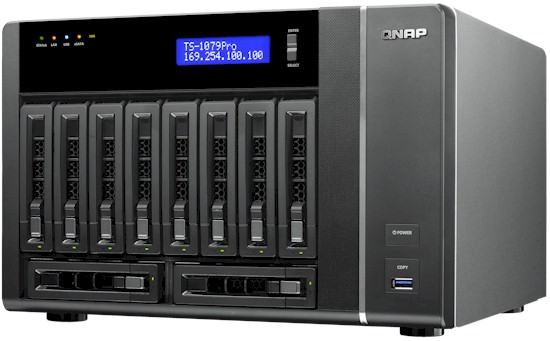
| At a glance | |
|---|---|
| Product | QNAP Turbo NAS (TS-1079 Pro) [Website] |
| Summary | High-performance BYOD ten-bay Intel i3-2120 RAID SATA NAS with many serving options. |
| Pros | • Optional 10 GbE port •> 180 MB/s RAID 5 write,> 215 MB/s read w/ 10 GbE connection |
| Cons | • Not cheap • Did not mount USB 3.0 test drive |
Typical Price: $2740 Buy From Amazon
Overview
I think I’ve said before that the money for NAS manufacturers today isn’t in selling to consumers. No, the business that they’re all after is replacing much more expensive servers that many small-to-medium businesses rely on for storing and sharing their files and, more recently, running virtual servers.
QNAP’s TS-1079 Pro is one such contender. It’s one of the most powerful desktop form-factor NASes you can buy today and is priced as such. If dropping around $2,500 for ten bays of storage goodness—without drives—doesn’t make you flinch, then read on.
The TS-1079 Pro actually isn’t the most capacious desktop NAS we’ve tested. That would be Synology’s 12-bay DS2411+, which we looked at only a few months ago. Since the Synology is powered only by an Intel D525 Atom, however, it’s not in the same class as the TS-1079 Pro. More like it would be Synology’s DS3611xs, which we haven’t tested and that Synology is asking $3,500 (!) for.
The TS-1079 Pro arranges its drives in an eight-vertical/two-horizontal format. This gives it a good-sized footprint (almost 13" wide and deep), so you may need to finally clean up your desk before you can find a spot for it.
Given all that weight to support (twelve 3.5" SATA drives are heavy, Bubba), the 1079’s limits its use of plastic to front panel bezels and some of the drive trays. The metal chassis seems well built and I heard nary a buzz or rattle from it.
The front and rear panel callout diagram below reveals a complete set of expansion ports including two USB 3.0, two eSATA and four USB 2.0. You get two 10/100/1000 Ethernet ports that can be configured in the usual failover, separate or aggregated modes. And you can plug a monitor into the VGA port and a keyboard and mouse into the USBs and have direct root console access. There is also an HDMI port (not called out in the digram below, but above the VGA port) if your monitor uses one of those instead.
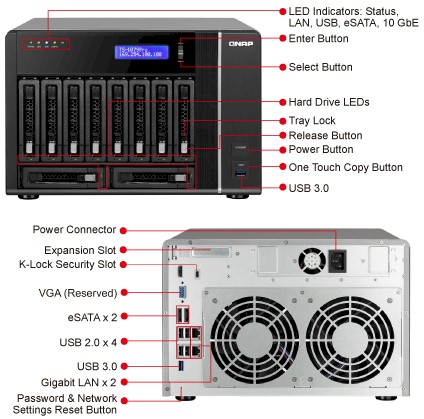
Front and Rear Panels
That expansion slot at the rear upper left actually is a PCIe slot, which is where the optional PCIe dual-port 10 GbE interface resides (an Intel X520-DA2, to be specific). The slot can also be fitted with a dual-port 1 Gigabit adapter or any of these other 10 GbE adapters.
My test NAS was equipped with the 10 GbE card and QNAP loaned me another Intel X520 for the NAS testbed (good thing, since the going rate is $450 – $500). So this review will contain the first test results of a NAS using a 10 Gigabit Ethernet connection.
Inside
The 1079 Pro has some good serviceability design features. The two large (about 5" across) fans are mounted on a panel that be removed quickly via four external screws for easy replacement without even having to open the case.
The inside view below shows that the power supply is readily accessible, as is the 10 GbE card.
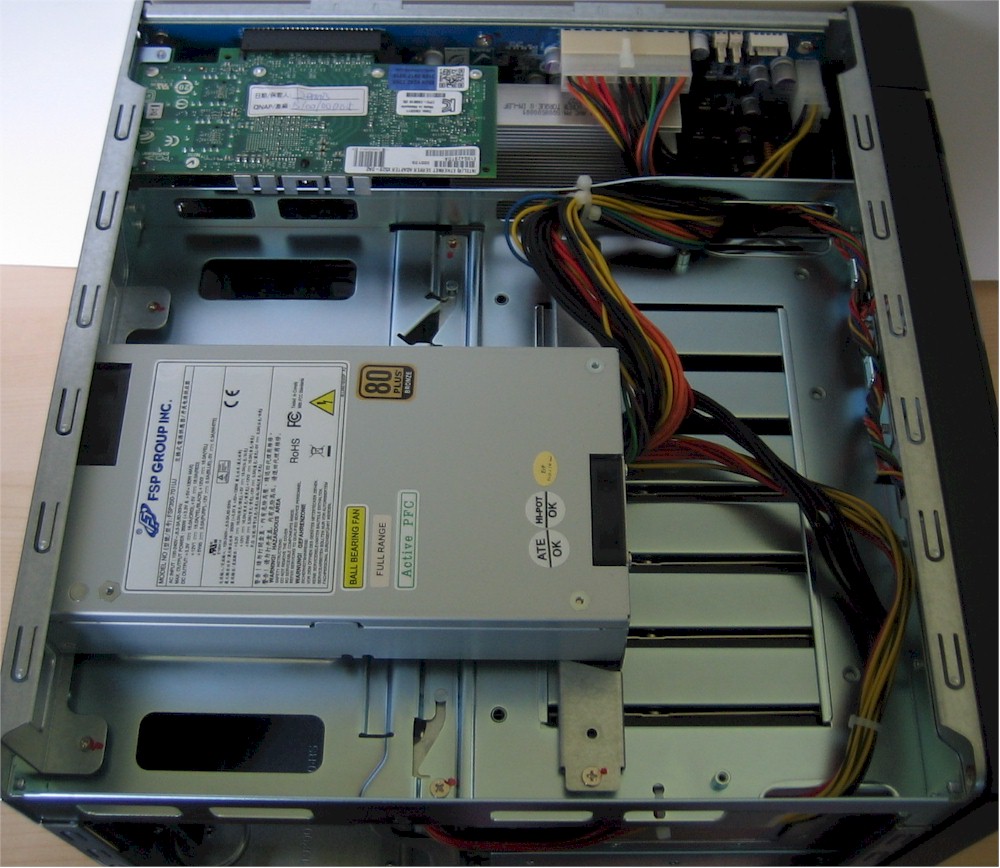
TS-1079 Pro Internal view – top
It looks like there is even room for a second power supply, should QNAP come up with a redundant supply option. At any rate, the single supply is easily replaceable. Motherboard replacement, however, is not so easy and looks like it requires some major chassis disassembly. So I left it alone.
QNAP specs the CPU as a 3.3 GHz Intel Core i3-2120. It’s a bit more powerful than the Synology DS3611xs’ 3.1 GHz i3-2100. I didn’t try to find out which companion device is used, but it probably is an Intel H67.
Both products have 2 GB of DDR3 RAM. But if you look at the middle right of the photo below, the tie-wraps around the socket DIMMs indicate that QNAP doesn’t want you upgrading RAM on your own.
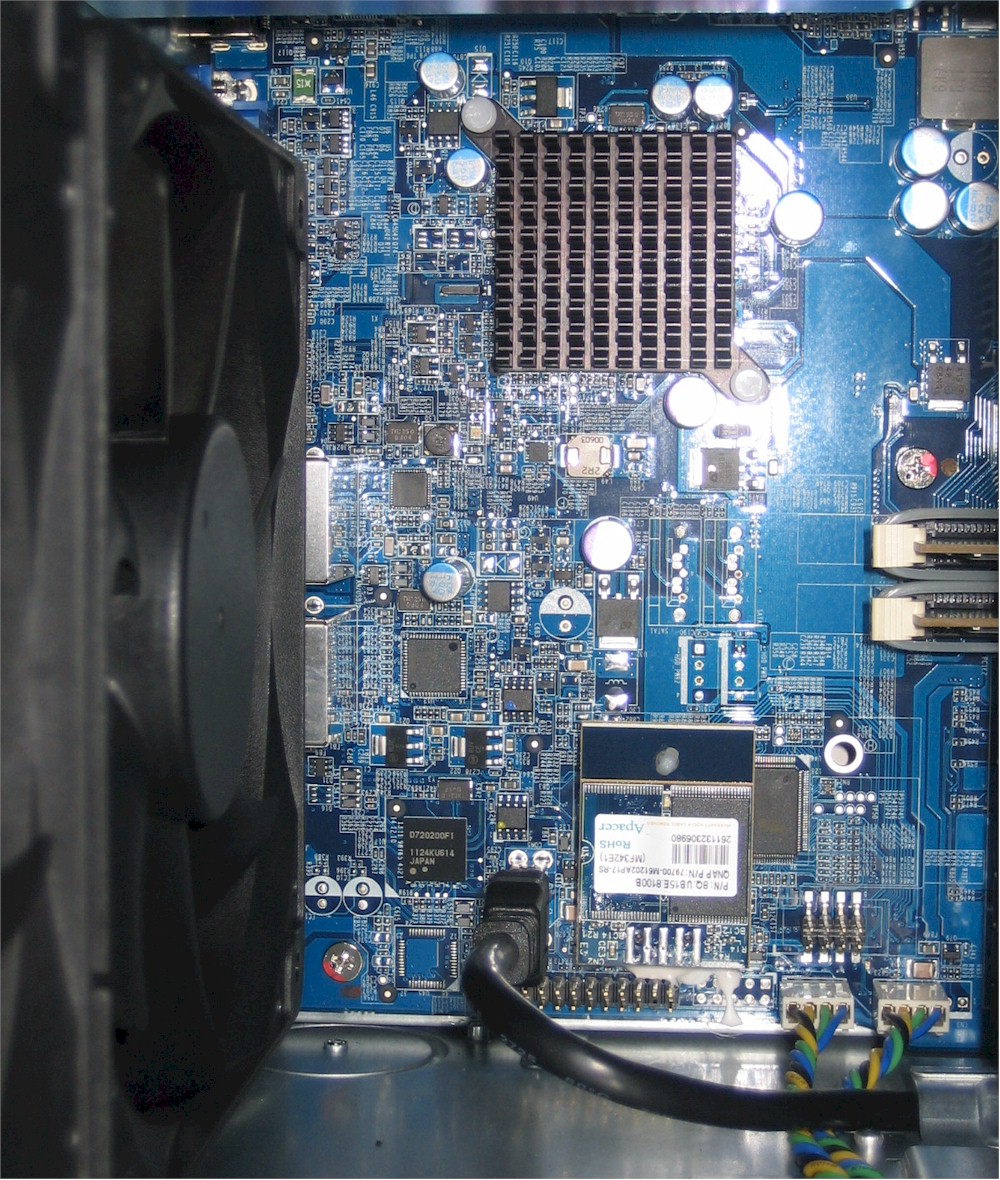
TS-1079 Pro Internal view – top
Also visible in the photo is the 512 MB flash DOM, as well as the NEC D720200F USB 3.0 controller and cable out to the front panel USB 3.0 port.
Instead of the two Intel WG82574L controllers normally seen in Intel CPU-based designs, there is only one. The second port is serviced by an Intel WG82579LM, which is in a much smaller package.
SATA for the ten drive bays is handled by four Marvell 88SE9125 6 Gb/s SATA controllers mounted directly on the drive back backplane along with a Xilinx Spartan XC3S50 FPGA to tie them together.
As is our practice, I ran performance tests using four-drive arrays. So, QNAP supplied only four Seagate Constellation ES 1 TB (ST1000NM0011) drives. These brought total power draw to a relatively hefty 72 W when spun up, with power dropping only to 52 W with the drives spun down.
I judged noise as medium, with both quiet fan and drive noise audible in my quiet home office. With a full drive complement I’d expect noise level to rise from both fans and drives. But given the relatively open design of the cabinet, large fans and lots of space between components, I would not expect the 1079 Pro to be a real screamer (noise, that is) under full load.
Features
The 1079 Pro supports all the features in its latest V3 firmware (3.5.2 Build 1126T, to be exact). My last feature review was for Version 3.3. Version 3.5 includes the MyCloudNAS feature and ElephantDrive cloud backup. Network backups can now be scheduled or real-time and backed up to rsync or FTP targets.
Check out the live demo and take a test drive.
Performance
I tested the TS-1079 Pro with 3.5.2 Build 1126T firmware, using our NAS test process and four-drive RAID 0, 5 and 10 volumes. The Benchmark summary below shows RAID 0, 5 and 10 results, along with iSCSI write /read and attached and networked (rsync) backup.
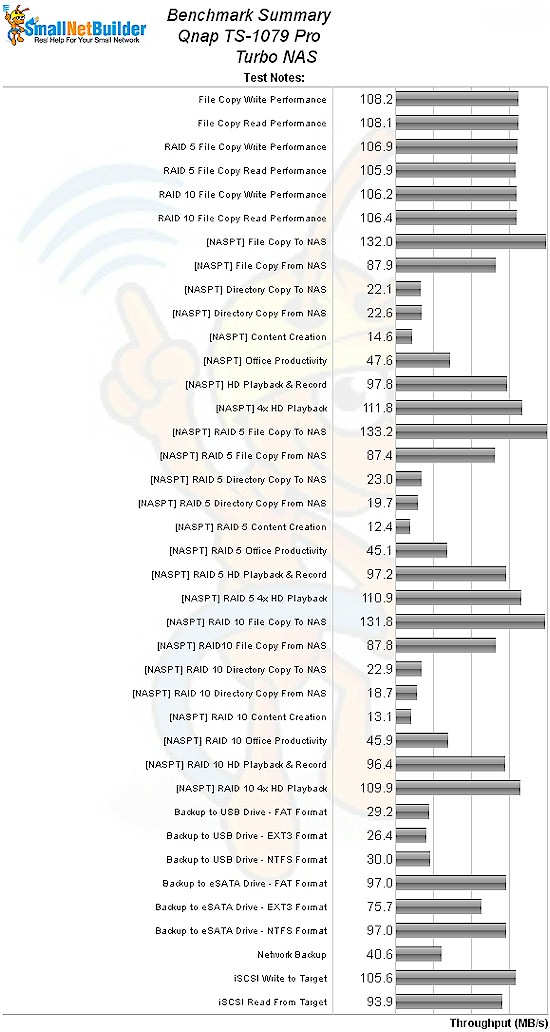
TS-1079 Pro Benchmark summary
Windows File Copy in all tested RAID modes measured 105 MB/s or slightly higher for both read and write. I suspect that this is at or near the limit of our testbed with a Gigabit Ethernet connection.
Intel NASPT File Copy results came in consistently higher with RAID 0, 5 and 10 results all over 130 MB/s. NASPT file copy from the NAS, however, was significantly slower, all measuring around 88 MB/s. As is typical, the NASPT Directory copy test, which copies many smaller files ran much lower, in the 18 – 20 MB/s range.
iSCSI performance using a 10 GB target on a RAID 5 volume was pretty good at 106 MB/s write and 94 MB/s read.
Attached backup to our standard Iomega UltraMax Pro drive in RAID 0 ran at 97 MB/s when FAT and NTFS formats were used. Best speed with the same drive connected via USB 2.0 was 29 MB/s with FAT format.
I tried to mount a WD MyBook 3.0 drive to test USB 3.0 backup speed, but could not get the drive to mount after multiple attempts. I flagged QNAP about this, but received no explanation. Network backup to a DeltaCopy target on our NAS Testbed system clocked in at 41 MB/s.
A competitive view is shown in the RAID 10 File Copy charts below. I used RAID 10 vs. RAID 5 because it imposes the toughest computational load on the NAS. Since there are no other 10 bay NASes, I did not filter the charts for drive count.
The 1070 Pro is the only Intel i3-based NAS in the chart. But all the competitors near the top of the chart are Intel based. The older Thecus N7700Pro runs on an Intel Core 2 Duo, while the newer N5200XXX uses a D525 Atom.
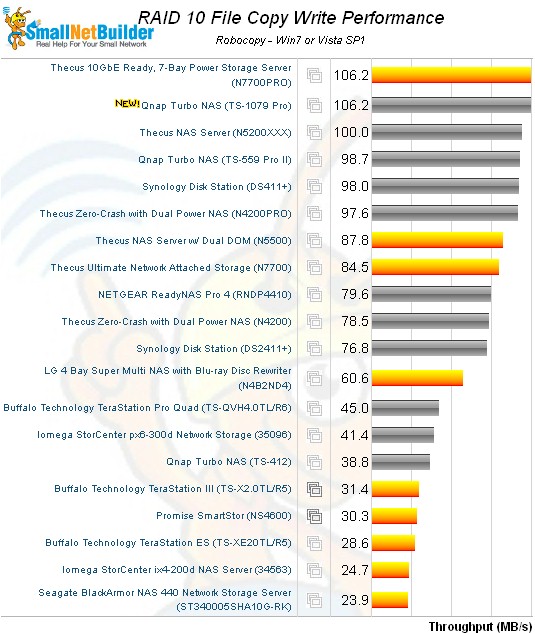
TS-1079 Pro File copy – Raid 10 – write
In the Read chart, the Synology DS2411+ also uses a D525 Atom, while the older DS411+ uses an Atom D510.
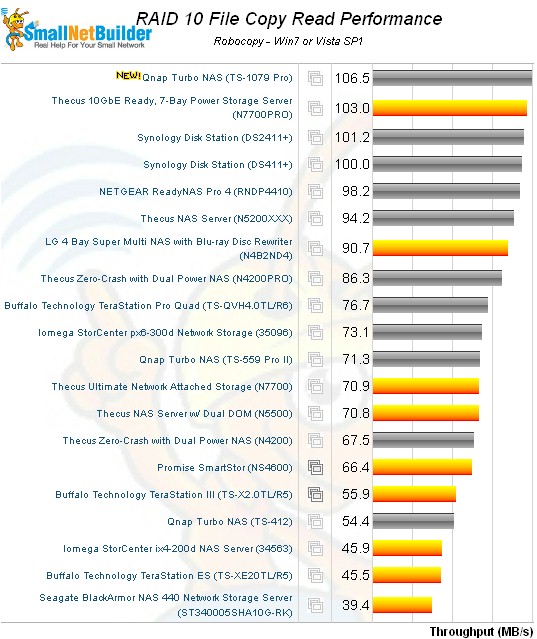
TS-1079 Pro File copy – Raid 10 – read
It’s interesting that the Atom-based NASes, which are much cheaper and less power-hungry than the i3-based 1070 Pro are pretty close in performance. Use the NAS Charts to further explore and compare the TS1079 Pro’s performance
10 GbE Test
When I tested the Synology DS2411+, I ran some tests with its dual Gigabit Ethernet ports in 802.3ad link aggregation mode. The details are here, but the short story is that I got around 156 MB/s write and a best case read of 178 MB/s. This was with a RAID 5 volume.
This time, QNAP asked me if I’d like to try a test using a 10 GbE connection, so I thought I’d give it a shot. I installed the loaner Intel X520-DA2 dual-port adapter in the NAS testbed machine in the ASUS P7H57D-V EVO motherboard’s PCIe 2.0 x1 5GT/s slot. I downloaded the latest driver (2.9.71.0 Win 7 64 bit), set static IP addresses on the testbed and NAS 10 GbE ports, connected the cable and disconnected the Gigabit Ethernet cable to ensure that the 10 GbE interface was used. I then ran my standard benchmark suite, which runs the Windows file copy and Intel NASPT tests three times. The NAS was configured in RAID 5 for the test.
The NASPT test results shown below are the average of three test runs. The NASPT file copy results of 290 MB/s write and 324 MB/s read can be compared to 133 MB/s write and 87 MB/s read running the same tests with a 1 GbE connection. I have no explanation for the much lower read results with the 1 GbE connection vs. the 10 GbE. If QNAP comes back with an explanation, I’ll update it here.
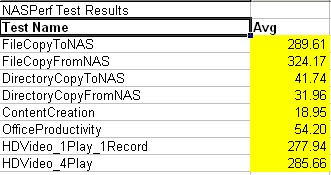
TS-1079 Pro 10 Gbe test – NASPT
The Windows filecopy and iSCSI tests are shown in the table below. The large numbers are the direct Bytes/sec output from the robocopy runs, which are averaged and converted to MB/s for the bolded results. As with the 1 GbE connection tests, the Windows filecopy tests run lower than the NASPT results. But they still are significantly higher than the 107 MB/s write and 106 MB/s read results with the Gigabit Ethernet connection.
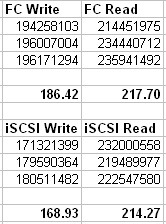
TS-1079 Pro 10 Gbe test – Windows file copy, iSCSI
I was quite suprised that iSCSI performance improved as much as it did, especially for read, which measured only 94 MB/s with a 1 GbE connection.
Closing Thoughts
At around $2,500 without drives, QNAP’s TS-1079 Pro is not going to find its way to many consumers’ homes. But small businesses looking for a less expensive (and less expandable) alternative to Synology’s DS3611xs may want to warm up their checkbooks.
